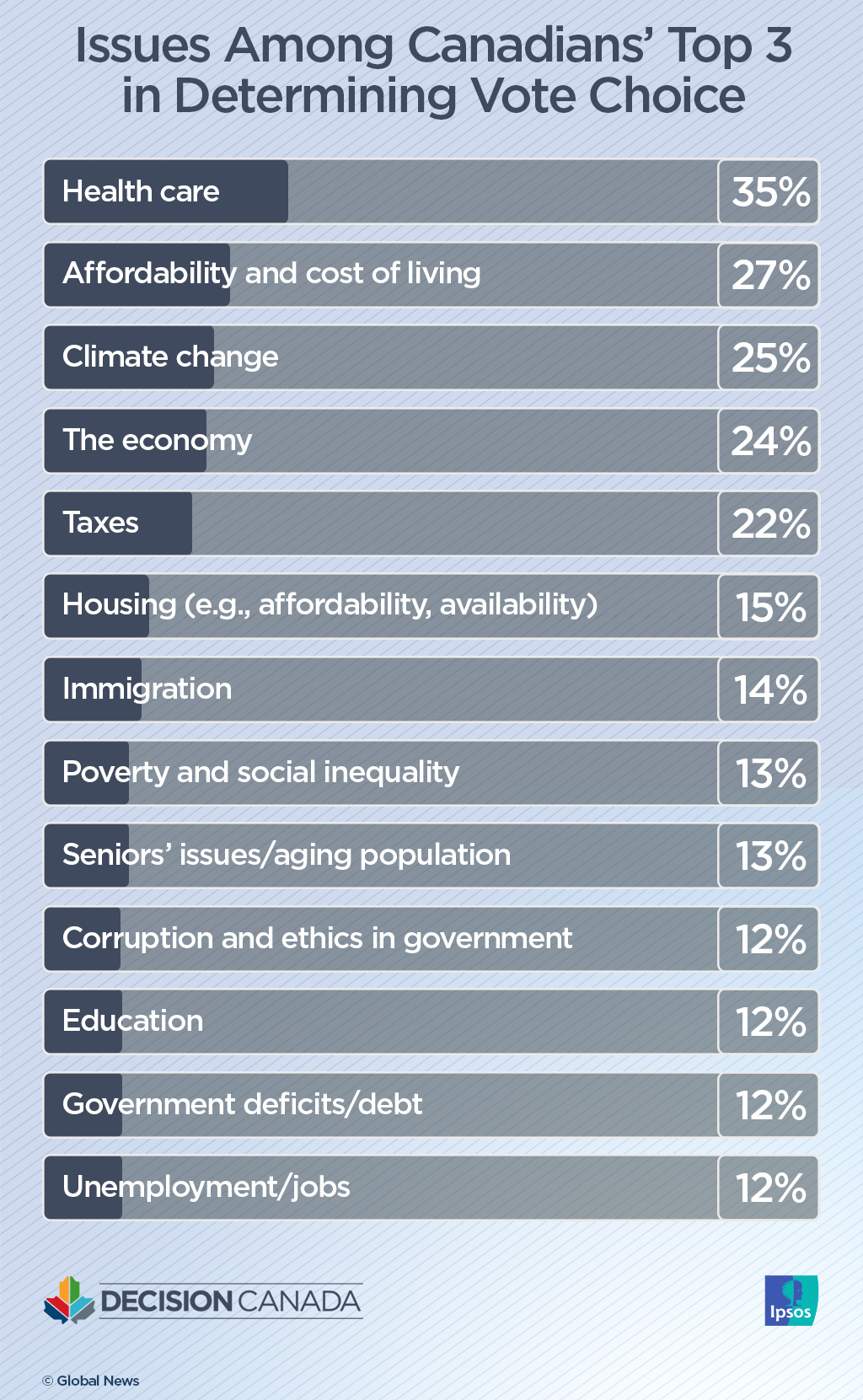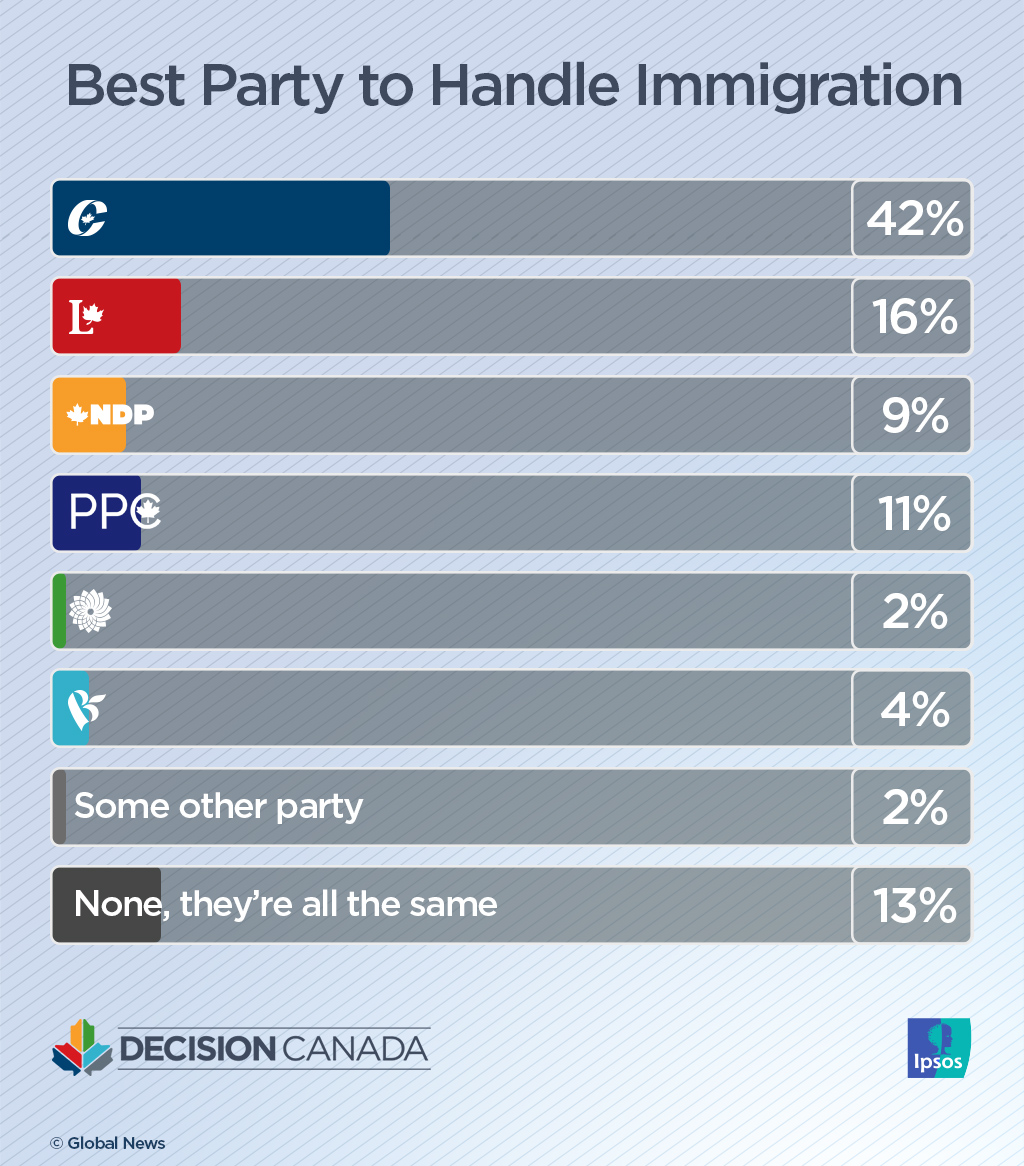Rhetoric about immigration has entered the federal election campaign, but an Ipsos poll shows it’s far down the list of ballot-box issues as Canadians weigh who will get their vote.

In the poll, conducted between Sept. 11 and Sept. 13 for Global News and La Presse, respondents were asked to pick three topics they consider most important in determining how they will cast their ballots.
The most popular issues were health care at 35 per cent, affordability and the cost of living at 27 per cent, climate change at 25 per cent and the economy at 24 per cent.
Fourteen per cent of those surveyed said immigration was a top election issue.
“It is one of those issues that will not come up as a most important issue like things like health care or, say, for example, affordability,” said Darrell Bricker, CEO of Ipsos Public Affairs.
“But it’s something that is a really hot issue for a specific group of voters and it’s an issue … the political leaders are going to have to be very careful about so it’s one that tends to have a lot of partisan noise around it.”
Those who said immigration is one of their top issues tended to be concerned with reducing it, the poll found.
They were most likely to say Canada accepts too many newcomers (49 per cent) or were concerned about irregular border crossings (31 per cent). Only five per cent of those who said immigration was a top issue said they felt that Canada needs to increase immigration, and six per cent were concerned about Canada aiding in the refugee crisis.
The results were not consistent across the country.
Atlantic Canadians were the least likely to consider immigration a key issue at nine per cent, followed by B.C. at 11 per cent and Alberta at 13 per cent. Ontario and the Prairies were at 14 per cent.

Get daily National news
Quebec, which has banned public servants from wearing religious items such as the hijab in the name of “secularism,” leads the country on considering immigration a top ballot-box issue at 17 per cent.
Bricker said there would be an “audience” for the issue, particularly in Quebec but also in other areas, should People’s Party of Canada Leader Maxime Bernier decide to bring it up during the upcoming leaders’ debates. The party has vowed to drastically reduce the number of immigrants to Canada each year and scrap the country’s multiculturalism policy.
“But it will not only be the way that Maxime Bernier responds to, raises the issue, but it will be how the other party leaders respond to it,” he said.
Bricker said the Liberals and the Conservatives “are trying to sit astride of that difference between the province of Quebec and, basically, the rest of the country” on immigration.
The poll found that those supporting the Conservatives, People’s Party of Canada or the Bloc Québécois were more likely to consider immigration an important election issue.
The governing Liberals are lagging far behind the Tories when it comes to which party is best to tackle immigration, according to the survey.
Four out of 10 Canadians say the Conservatives are the preferred party, compared to 16 per cent for the Liberals, 11 per cent for the People’s Party and nine per cent for the NDP.
WATCH: Canada’s favourite pick for prime minister?

Bricker said that the Tories’ perceived strength on the file represents a “vulnerability” to the Liberals, whose stance on immigration has become a cornerstone of their reputation on the world stage.
“What they (the Liberals) are trying to do is turn it into an issue not about the immigration process or about the numbers of immigrants but, really, about the question of tolerance,” he said. “So it’s really about an appeal to the hearts and minds of Canadians around this idea that diversity is our strength.”
In some parts of the country, however, Bricker said that message won’t necessarily be perceived the way the Liberals would prefer.
These are some of the findings of an Ipsos poll conducted between Sept. 11 and 13 on behalf of Global News and La Presse. For this survey, a sample of n=2,562 Canadians aged 18+ was interviewed. A sample of n=2,062 was interviewed online via the Ipsos I-Say panel and non-panel sources, and respondents earn a nominal incentive for their participation. A sample of n=500 Canadians aged 18+ was interviewed by live-interview telephone interviewers by landline and cellphone using random-digit dialling. Quotas and weighting were employed to balance demographics to ensure that the sample’s composition reflects that of the adult population according to Census data and to provide results intended to approximate the sample universe (weighting efficiency=62.9 per cent). The precision of Ipsos polls, which include non-probability sampling, is measured using a credibility interval. In this case, the poll is accurate to within ± 2.2 percentage points, 19 times out of 20, had all Canadians been polled. The credibility interval will be wider among subsets of the population. All sample surveys and polls may be subject to other sources of error, including but not limited to coverage error and measurement error. Ipsos abides by the disclosure standards established by the Canada Research Insights Council, found here.










Comments
Want to discuss? Please read our Commenting Policy first.